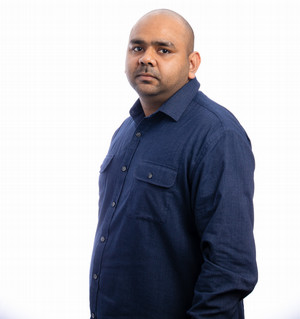General Information
Biography
Madhur Mangalam is an accomplished Assistant Professor in the Department of Biomechanics at the University of Nebraska in Omaha. He has a stellar academic background, earning his Bachelor's and Master's degrees in Life Sciences from the prestigious Indian Institute of Science Education and Research in Pune, India. His insatiable curiosity and passion for understanding the human mind led him to complete his Ph.D. in Psychology at the renowned University of Georgia in Athens, followed by rigorous postdoctoral training in Neuroscience at Northeastern University in Boston.Dr. Mangalam's research pursuits are at the forefront of interdisciplinary innovation, primarily focusing on unraveling the nonlinear dynamical principles that underlie perception-action mechanisms and embodied/embedded cognition. His scholarly journey is marked by a commitment to advancing our understanding of these intricate processes. Furthermore, he is a pioneer in developing cutting-edge nonlinear analytical methods, which play a pivotal role in uncovering and deciphering these fundamental principles. With his exceptional academic journey and dedication to pushing the boundaries of knowledge, Dr. Mangalam continues to make impactful contributions to biomechanics, psychology, and neuroscience.
Teaching Interests
Dr. Madhur Mangalam's teaching interests encompass a broad spectrum of interdisciplinary topics, reflecting his commitment to fostering a holistic understanding of complex cognitive and biomechanical processes. He is passionate about sharing his expertise in areas such as:Perception-Action Mechanisms: Dr. Mangalam is dedicated to imparting knowledge about the intricate relationship between perception and action, helping students explore how the human mind and body interact to shape behavior.Embodied and Embedded Cognition: His teaching extends to embodied and embedded cognition, where he guides students in unraveling the profound impact of physicality and environment on cognitive processes.Nonlinear Dynamical Principles: Dr. Mangalam's expertise in nonlinear analytical methods allows him to equip students with valuable tools for exploring the nonlinear dynamical principles that underlie various phenomena in biomechanics, psychology, and neuroscience.Interdisciplinary Innovation: He encourages students to embrace interdisciplinary thinking, fostering a mindset that transcends traditional boundaries to foster innovation and fresh insights in their academic pursuits.Cutting-Edge Research Methods: Given his pioneering work in developing advanced analytical techniques, Dr. Mangalam is eager to empower students with the skills to tackle complex research questions and explore new frontiers in their studies.Dr. Mangalam inspires students to engage critically with these subjects through his dynamic teaching approach, fostering a deeper understanding of the intricate connections between mind, body, and the broader world. His dedication to excellence and innovation in education enriches students' academic experience, seeking to explore the intersections of biomechanics, psychology, and neuroscience.
Research Interests
Motion is a paramount physiological indicator, often considered the sixth vital sign. It presents an invaluable avenue for insights into neurological health, cognitive function, injury risk assessment, and various facets of overall well-being. Notably, motion represents one of the rare behaviors amenable to objective measurement and quantification, offering a foundation for rigorous, personalized, and reproducible assessments. Consequently, my research investigates human movements, aiming to elucidate the intricate "choreography" underpinning physiological fluctuations associated with complex behaviors and functions.My research pursuits encompass a wide spectrum of intricate tasks, including perceiving the length of a handheld rod through proprioception without visual input and deciphering the auditory output of text-to-speech synthesizers. To achieve these aims, I rely heavily on statistical modeling techniques applied to longitudinally collected multimodal human movement data within healthy and clinical populations. The instrumentation employed for data acquisition encompasses an array of cutting-edge technologies, including motion capture systems, eye-tracking devices, force plates integrated into the flooring, electromyography tools, FLIR/RGBD video cameras, inertial measurement units, and immersive virtual reality setups.A distinctive feature of my research involves the utilization of advanced analytical methodologies, such as "multifractal analysis" and "multiscale probability density function analysis," borrowed from statistical physics and fluid dynamics. These techniques are employed to scrutinize the temporal structures inherent in physiological data. Furthermore, my work extends the boundaries of these analytical approaches to investigate the unfolding of complex psychological phenomena across multiple spatiotemporal scales, encompassing individuals, groups, and populations and spanning temporal domains from seconds to minutes to weeks.The overarching objective of my research program is to uncover and model the dynamic, nonstationary, and far-from-equilibrium processes that underlie the genesis and manifestation of biological and psychological behaviors. This endeavor promises to shed light on these phenomena' creative and emergent aspects, enriching our understanding of the intricate interplay between physiological and psychological processes.
Service Summary
Dr. Madhur Mangalam has demonstrated a steadfast commitment to service within the Department of Biomechanics, making significant contributions in various vital areas. Their dedication to academic excellence and scholarly advancement is reflected in their multifaceted roles, including:Peer-Review Expertise: Dr. Mangalam serves as a vital contributor to the academic community by actively engaging in peer review for esteemed peer-reviewed journals. Their rigorous and insightful evaluations contribute to the dissemination of high-quality research, helping to maintain the integrity and excellence of scholarly publications.Seminar Series Leadership: As an organizer of the Department of Biomechanics seminar series, Dr. Mangalam plays a pivotal role in enriching the academic environment. Through curating and facilitating engaging seminars and presentations, they foster intellectual growth, promote interdisciplinary collaboration, and ensure that the department remains at the forefront of cutting-edge research and discussions.Academic Standards Advocacy: Dr. Mangalam serves as a distinguished representative of the Department of Biomechanics on the Academic Standards and Performance Committee. In this capacity, they bring expertise and a deep understanding of academic rigor to the committee's deliberations. Their contributions help shape policies and standards that uphold the department's commitment to excellence in education and research.Dr. Mangalam's tireless dedication to service reflects their passion for biomechanics and unwavering commitment to elevating the department's scholarly endeavors. Their multifaceted contributions ensure that the Department of Biomechanics continues to thrive, fostering an environment of academic excellence and innovation.
Education
Ph D, University of Georgia, Athens, Georgia, Psychology (General), 2018
Professional Development
Institutional Training, New Faculty Onboarding, 07/05/2023 - 08/09/2023
